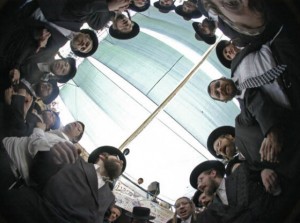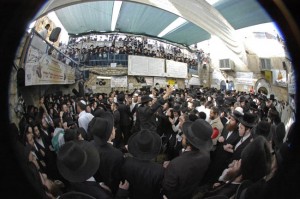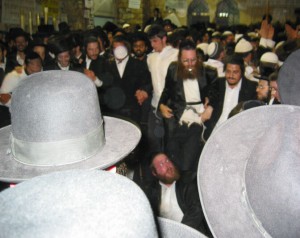Call Jewish Fundamentalism What It Is
We hear about Christian Fundamentalists and Islamic Fundamentalists all the time. The terms conjure up scary images of Koran-burning Evangelicals or Israel-flag burning radical Islamists. So why is it, when it comes to Jewish Fundamentalists, we’re afraid to use the term, and think of Hasidim as cuddly-cute characters from Fiddler on the Roof or The Chosen?
True, Jewish Fundamentalists lack the power of their Christian and Muslim brothers – but that’s only because of numbers. Where the fundamentalists do take control, as in New Square in New York (where dissenters are routinely harassed, most recently as last May, when one was set on fire and nearly died) or religious neighborhoods in Israel, they’re every bit as violent, intolerant, and offensive to basic human rights. They’re no different from other fundamentalists. They’re just usually less numerous.
Fundamentalism is generally defined as a strict attachment to unwavering, irreducible beliefs – such as the Bible is inerrant, or the world was created in seven days. The term, and the movements it denotes, are recent: it was first used in the 1890s, to describe Protestant movements seeking a return to the “fundamentals” of Christianity. More recently, it has taken on an added meaning, denoting religious conservatives who seek a return to an imagined previous era of stronger religious values, and who use political power or violence (or both) to achieve it.
This is as true of Haredim as of others. Like Christian and Islamic fundamentalists, Jewish fundamentalists are not content to lead their faux-19th-century lives without disturbing the rest of us. It’s a myth that Jews are somehow more “live and let live” than Christians or Jews. A few months ago in New York, the Agudath Israel of America – part of the world’s largest haredi political organization – organized massive phone and email campaigns against same-sex marriage. Never mind that what happens in secular state law is of no halachic significance, and that the law exempted religious organizations from having to obey it. And this was just the latest attempt of fundamentalists to coerce a wider society to adopt their reactionary values. Just like Christian “Intelligent Design” advocates, anti-reproductive-choice activists, and, yes, sharia-obeying Islamic radicals, Jewish fundamentalists are compelled by their fundamentalism not only to live backward lives themselves – but to attempt to get the rest of us to do the same.
It’s a myth that Haredi fundamentalists are purely inwardly-focused. Sure, they may say that what they want is to protect their isolated, insular islands of religious life – shtetls of the postmodern world. But time and time again, they do that by curtailing other people’s freedom: women riding public buses in Jerusalem; women praying at the public, state-administered plaza in front of the Western Wall; gays marching for civil rights; conservative and Reform Jews seeking to have the Jewish state recognize their conversions and life-cycle events. The list goes on and on.
Obviously, I’m not talking about every Hasidic or non-Hasidic Haredi person. And I’m certainly not talking about most “modern” Orthodox Jews (although a few of them do fit the fundamentalist bill). But I am talking about the national and international organizations which claim to represent them. These are organizations committed to a utopian ideology constructed in deliberate opposition to small-l liberalism.
Presumably we’re afraid to call Jewish fundamentalists what they are because of the memories of persecution. After all, Hasidim suffered the worst in the Holocaust, and images of black-hatted Jews are still used in anti-Semitic ways, most recently by the ‘Intactivists’ in San Francisco, with their “Mohel Monster” looking eerily like an Elder of Zion. Certainly, we should all be sensitive to this historical and contemporary resonance, and double-check that we are not painting sinister pictures of “Jews trying to control” the government, or anything else. Jewish fundamentalists are no more hell-bent on controlling the government than are Christian and Islamic ones.
But no less, either. Whether it’s extorting money from Israeli political parties for sectarian yeshivas, or using block-voting to sway state politicians in New York, Jewish fundamentalists are activist, mean, and committed to their rigid view of human society. They do not “keep to themselves,” and the Fiddler image is as demeaning of their human dignity as it is dangerous to our society. They are grown-ups, and they wield as much power as they can get.
Jewish fundamentalism is also like other fundamentalisms in that it is, ironically, a quintessentially modern phenomenon. When the Hatam Sofer said, in the 19th century, that “innovation is prohibited by the Torah,” this was among the greatest innovations in Jewish intellectual history. The mainstream of Jewish tradition had long valued flexible interpretation of Jewish law, and the most up-to-date understanding of “secular” science, whether in the Talmud, or the writings of Maimonides, or in the work of the Jewish Nobel laureates. The notion that text and law are forever immutable flies in the face of midrash and traditional Talmudic hermeneutical practice. And the idea that in 2010, Jews should be dressed like 18th century Hungarian petty nobility is radically new, totally without precedent in Jewish history. Never before have a group of Jews sought to dress three hundred years out of date.
Jewish fundamentalism is real, dangerous, and oppressive. And just as Christian and Islamic fundamentalists have increasingly defined what those other religions stand for – to the great dismay of progressives of each – so too, we are at risk of ignoring this threat to engaged, contemporary Judaism by those who insist that only its most retrograde formulation is authentic.. Fundamentalism is an individual neurosis and a collective scourge. But even if we find it benign, we should at least have the courage to name it.
![[the current issue of ZEEK]](../../image/2/100/0/5/uploads/leftistethicistgraphic-52842c6a.png)
- 5000 Pages of Zeek
- Founded in 2001, Zeek was the first Jewish online magazine, and we have over 5000 pages online to prove it, all available free of charge. Read more in the Archive.
More articles by
- We're on Hiatus!
- Euphoria, Curiosity, Exile & the Ongoing Journey of a Hasidic Rebel: A Q & A with Shulem Deen
- Purim’s Power: Despite the Consequences –The Jewish Push for LGBT Rights, Part 3
- Love Sustains: How My Everyday Practices Make My Everyday Activism Possible
- Poet Q, Poet A: Jews Are Funny! Six Poets on Jewish Humor, Poetry & Activism and Survival
More articles in




